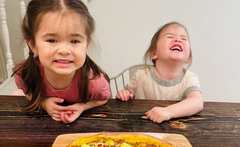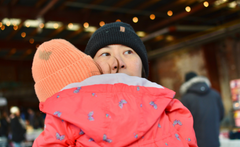
The 4-month mark is a big milestone in your little one’s life, in large part due to some major brain and physical development milestones. Most babies by this age will have doubled their birth weight and will be sleeping for longer periods at night.
Your 4-month-old will also start to come out of their shell. You'll notice that their personalities really emerge and their physical abilities improve.
Your baby is continuing to learn and develop so much in all domains of development, including social/emotional, language/communication, cognitive (learning, thinking, problem-solving), movement, and sensory. Keep reading to learn more about milestones that most babies are reaching at 4 months.
Keep in Mind
Keep in mind that the actual age when a typically developing child reaches a milestone really can vary. Each child develops in their own unique way, so there's no need to worry unnecessarily if your child isn't hitting a milestone right away, especially if your child is hitting most milestones in other domains.
That being said, you are your child's best advocate. If there is an issue, it's always best to act early, so if you have any concerns about your child's development, please speak with your pediatrician.
Social and Emotional

This will be a fun month for your baby! He is becoming much more active and intrigued by his surroundings. At 4-months-old, many babies start to become little social butterflies.
Your baby will also begin to recognize familiar faces now. He's likely going to reward you with a big smile when you walk into the room. He'll also imitate some facial expressions or sounds and respond to affection. You might even get a first laugh.
Many babies at this age:
- Smile spontaneously, especially at people
- Like to play with people and might cry when playing stops
- Copy some movements and facial expressions, like smiling or frowning
- Watch faces closely
Language/Communication

By four months, your baby will begin to notice not only the way you talk but the individual sounds you make. She’ll listen to vowels and consonants and start to notice the way these sounds combine into syllables, words, and sentences.
Up until now, your baby communicated by sighing, cooing, and crying. But by around four months, she’ll graduate to babbling, a combination of consonant and vowel sounds and includes single syllable sounds like “da” or “ba,” and more complex, strung-together sounds like "a-pa," "a-ba" or “ba-ba-ba-ba.”
Although babbling might sound like nonsense gibberish, if you listen carefully, you'll notice she's using the rhythms and characteristics of her native language. She may raise and drop her voice the way we do when making a statement and asking a question.
Encourage her by talking to her throughout the day. When she says a recognizable syllable, repeat it back to her and add simple words that contain that sound. For example, if she says the sound “bah”, you can expand that utterance and say “Baa Baa Black Sheep”.
But there's no "wrong" way to talk to your baby at this age. Baby babbles are building blocks for language and comprehension, and even the silliest sounds and noises will help your child practice the mouth movements he'll need to start talking.
Many babies at this age:
- Begin to babble
- Cry in different ways to show hunger, pain, or being tired
- React to sudden noises or sounds
Cognitive Milestones

Your baby may not have showed many observable signs of thinking, but studies show that from the moment your baby is born, he is learning about and constantly taking in the world around him, even if it's not apparent to you or others.
Now, your baby’s memory and attention span is really increasing and you’ll start to notice evidence that not only is he absorbing information, but he's also applying it to his everyday activities.
He's making new discoveries every day. Objects like keys and make sounds when shaken; dropping items will elicit responses and reactions from others. It’s important to give your baby lots of tools to experiment and test his “theories”.
This Mama in the photo above is exposing baby to new sensory experiences as well as the concept of cause and effect with Jenny & Andy's Organic Crinkle Toys!
Many babies at this age:
- Are easily distracted by surroundings
- Start to predict routines (for example, stops crying when placed in a nursing position or flexes hips in anticipation of a diaper change)
- Repeat behaviours that produce a desired effect, such as batting a toy to move it
Movement/Physical Development

In the first four months, your baby will have established the muscle control needed to move both eyes and she'll be able to turn her head to follow the movement of objects.
The next major challenge is being able to hold her head up, and in order for your baby to master head control, she'll need to develop the neck, chest and arm muscles that will allow her to lift her head up independently and use her arms as support.
Her fine motor skills like dexterity is still developing, but by four months, she'll be able to easily bring interesting objects to her mouth for inspection. Graduation to picking objects up will likely happen at around six months.
Many babies at this age:
- Hold head steady, unsupported
- Push down on legs when feet are on a hard surface
- May be able to roll over from tummy to back
- Bring hands to mouth
- When lying on stomach, push up to elbows
- Use hands to support self while sitting
- While standing with support, accept entire weight with legs
- Reach for nearby toys while on tummy
- While lying on back, reach both hands to play with feet
Sensory Milestones

Now, your baby will be able to notice different shades of colour, especially red and green. He might even have specific colour preferences.
Your baby’s range of vision will also have increased by several feet or more. He can also track faster movements with his eyes, perceive depth, and grab at moving objects.
Hearing is crucial for developing speech. When your baby was younger, he understood your meaning primarily through the tone of your voice. Now, he can hear and pick up on the different sounds you make and the way words form sentences and try to imitate them.
Though sweetness is preferred, taste preferences continues to develop throughout your baby's first year. Studies show that a mother's diet can affect the way her breast milk tastes, which also shape your baby's flavour preferences later on.
Many babies at this age:
- Are able to calm with rocking, touching, and gentle sounds
- Enjoy a variety of movements
- Develop eye rods and cones (cells for vision), tracking objects and people
- Are interested in smells of food and have a stronger reaction to bad odours
- Sounds become associated with objects, sound mimicking begins
- Follow moving things with eyes from side to side
Want a handy checklist all in one place?
Download our Comprehensive Developmental Milestones Checklist PDF for free ☑️!
Developmental Milestones By Age
Sources:
- American Academy of Pediatrics. Caring for Your Baby and Young Child, 7th Edition: Birth to Age 5, Fifth Edition. 2009
- Centers for Disease Control and Prevention. Important Milestones: Your Baby By Four Months, 19 Oct. 2021
- Nemours Children's Health. Your Baby's Hearing, Vision, and Other Senses: 4 Months, Dec. 2017
- What To Expect. When and How Babies Lift Their Heads Up, 13 Oct. 2021
- What To Expect. When Your Baby Will Start Babbling, 5 Oct. 2021



